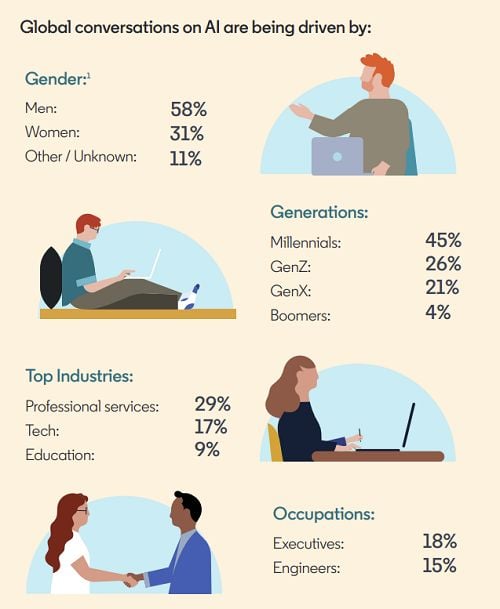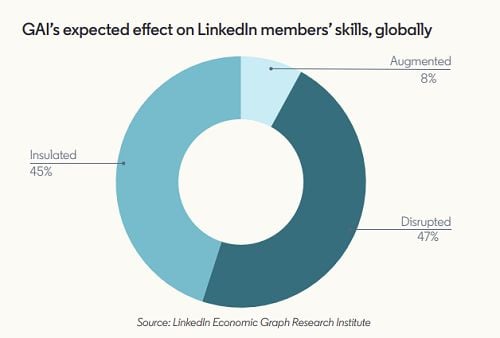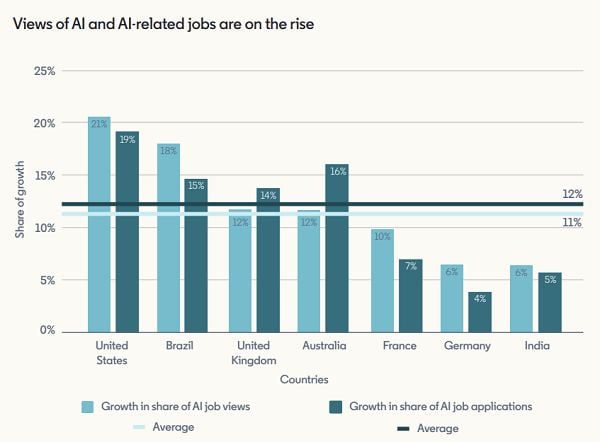As artificial intelligence and machine learning processes continue to evolve, the conversation around AI is also shifting from how such systems can help us, to how they might supplant us, in part or entirely, sometime in future.
And while AI doomerism is largely based on science fiction tropes, which are still a long way from possibly becoming a reality, it is worth considering how these tools will supplement your work, and what they may be able to do, moving forward, to advance your career.
Which is the focus of LinkedIn’s latest “Future of Work” report, which looks at how AI, specifically, is having an impact on different industries, and what LinkedIn users expect to see as a result of AI advances in their respective sector.
You can download the full 35-page report here, but in this post, we’ll take a look at some of the key notes.
First off, LinkedIn provides an overview of AI sentiment, and how LinkedIn users view the evolving generative AI offerings.
As per LinkedIn:
“Over the past year, AI has rapidly become a part of the cultural and business zeitgeist. On LinkedIn, we’ve seen conversations around AI increase by 70% and have also observed substantial increases in terms like “ChatGPT,” “Prompt Engineering,” “Prompt Crafting,” “Microsoft Copilot,” and “Generative Artificial Intelligence” on member profiles globally.”

It’s interesting to note the conversation trends here, and who exactly is leading the AI charge.
LinkedIn says that, in general, sentiment around generative AI (GAI) is largely optimistic, with 74% of executives believing that GAI will benefit their employees, and 47% of professionals globally believing that AI will help them advance their careers.
But at the same time, there are, of course, fears of how AI could take over certain jobs and industries, and the impacts that advanced automation may have on the workforce.
To provide more insight into this, LinkedIn’s separated likely AI impacts into three categories:
- Augmented – Jobs which include skills that can be replicated by generative AI, but still require people skills
- Disrupted – Jobs that include skills that can be largely replicated by AI, and are at risk of significant impacts as a result
- Insulated – Jobs that have a relatively small proportion of skills that generative can replicate, and are thus considered mostly safe from any significant disruption
Based on this, LinkedIn’s data currently suggests that around half of all jobs will face significant impacts from AI over time.

Which might well freak you out, but the reality is that all industries are looking into generative AI, and we’re only now in the early stages of seeing what the technology can do, and how it might fit into the modern workplace.
In other words, it is likely in your interest to at least accustom yourself to what’s possible with generative AI, and how it can assist in your work.
Which, evidently, many people are doing:

LinkedIn also notes that more companies are now advertising for AI roles, with the number of companies with a “Head of AI” position growing by double-digits since December 2022.
It’s an interesting overview of the state of AI disruption, and what it means for different sectors.
LinkedIn’s full report includes more in-depth breakdowns of how AI is expected to impact each industry, and how you can educate yourself to stay ahead of the curve (using LinkedIn Learning, of course).
There’s also an overview of LinkedIn’s own evolving AI tools, and how they can complement your process.
It’s an interesting overview, which provides further perspective on the impacts of generative AI, and how you can expand career resilience in-step.
You can download LinkedIn’s full “Future of Work” report here.



